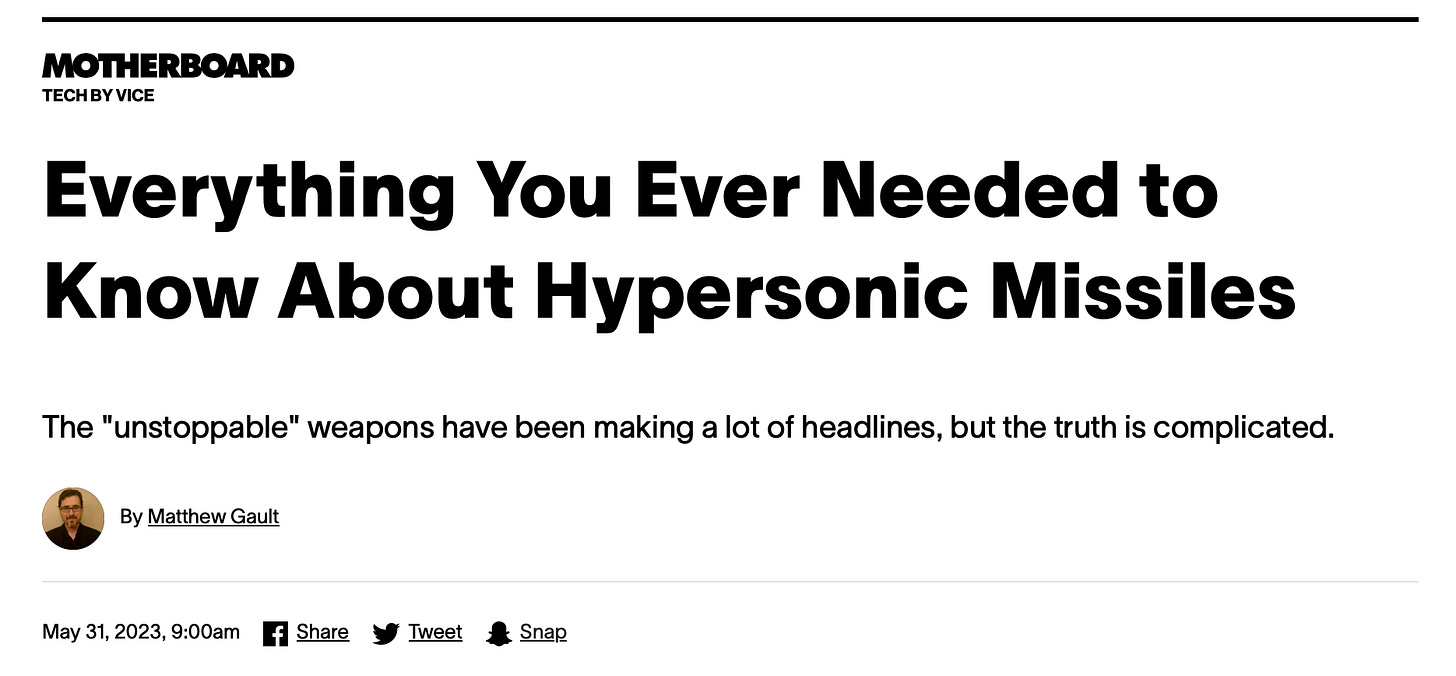I have had a surge of subscribers over the past week, many from the shoutout that the nice folks running Substack gave me in their “Substack Reads” this week. I just want to say hello and thank you to all who have joined this newsletter and give you a taste of what to expect.
I write mainly on national security issues with a slice of social justice. I’ve spent over 40 years in Washington working these issues, focusing mainly on nuclear security, missile defense, weapons procurement and alliance relations. I haven’t written much - either in general or in this newsletter - on my personal experiences. But I would like to. I would appreciate your thoughts as I try out a few posts along these lines.
In fact, I’d like your thoughts in general. Please use the “Comments” function to share any insights, requests, complaints or compliments.
Today, I just want to share a great story in Vice by Matthew Gault. He explains so much, so well about hypersonic weapons and missile defense. Most of the heavy lifting on the analysis is done by my friend and colleague, James Acton over at the Carnegie Endowment for International Peace. James now helps run the nuclear policy shop at Carnegie that I directed for nine wonderful years.
Gault allows me to make a cameo appearance. I gave him my views on missile defense. These are programs that I’ve tracked since 1983. That’s a lot of hearings, reports, tests, analysis and enormous amounts of BS about how well the systems work. Below, I reprint what is in Gault’s article. I encourage you to jump over to Vice and read the whole piece.
Excerpt from “Everything You Ever Needed to Know About Hypersonic Missiles,” by Matthew Gault
“If you ask the general public, ‘Do we protect America from missile attack?’ They would say, ‘Yes.’ They would think we have a missile defense. We do not. We should be absolutely clear, we do not have a system that can protect the United States from even a limited ballistic missile attack. It just doesn't work. We don't have it, we're very unlikely to have it, we are probably never going to have it,” Joseph Cirincione told Motherboard.
“If you ask the general public, ‘Do we protect America from missile attack?’ They would say, ‘Yes.’ They would think we have a missile defense. We do not.
Cirincione is a national security expert with a long pedigree. He’s retired president of the Ploughshares Fund, the former director of non-proliferation at the Carnegie Endowment for International Peace, and was a staffer for Congress for 9 years where he worked on military reform. Among other things, he investigated missile systems and nuclear weapons. “Even in perfectly scripted tests, they’re only 50% effective, not something you would want to base the defense of a country on,” he said.
Cirincione said that the U.S. only conducts staged tests of its missile-detection capabilities. “Can the radars of the missile see the warhead? Can the interceptor be guided into an intercept path successfully? Can it actually hit? To do that, you sort of stage the tests so that the defender knows exactly when the target is going to be launched, what the target looks like, what its radar signature infrared signature is going to be,” he said. “In some cases, we've put a radio transponder on the warhead that was sending out a here I am signal so that the interceptor could just ride that into it…we have never done a truly operational test to try to see if the interceptor can hit a target when the target is trying not to be hit.”
Attempting to intercept an ICBM in flight is like trying to shoot a bullet with a bullet when both bullets are flying upwards of 24,000 miles an hour. “It's amazing, we can do it at all,” Cirincione said. “This is a technological achievement that 50% of the time, granted under perfect conditions, we can hit a bullet with a bullet. That's amazing. Unfortunately, it's just not good enough. In thermonuclear war ‘almost’ doesn't count. You've got to defend 100% of the targets 100% of the time.”






This was really good. I appreciate the distinction between simply “hypersonic” which can be achieved by various missiles on re-entry and the boost glide variants that are in the spotlight these days. An actor could claim to have a hypersonic missile and it be the former and not the latter, though i’m not convinced the media or public will care to know the distinction in capability.
I'm hoping to find commentary that leaps over 1) current events, technological details, geopolitical strategies etc, to 2) a focus on the underlying human bottom line.
Example: If we got rid of all nuclear weapons, the great powers would then immediately turn their attention to other means of threatening their enemies with mass carnage. Before long we'd be right back where we are now.
Example: If we successfully removed all guns from the civilian population, violent men would then begin driving their cars in to crowds. Before long we'd be right back where we are now.
A focus on tools is ultimately a loser's game, because no sooner would we solve one problem than three more will appear. The real problem is not the weapons, but those who would use them.
Violent men? What to do about them? Until we find an answer, we're Thelma and Louise racing towards the cliff.